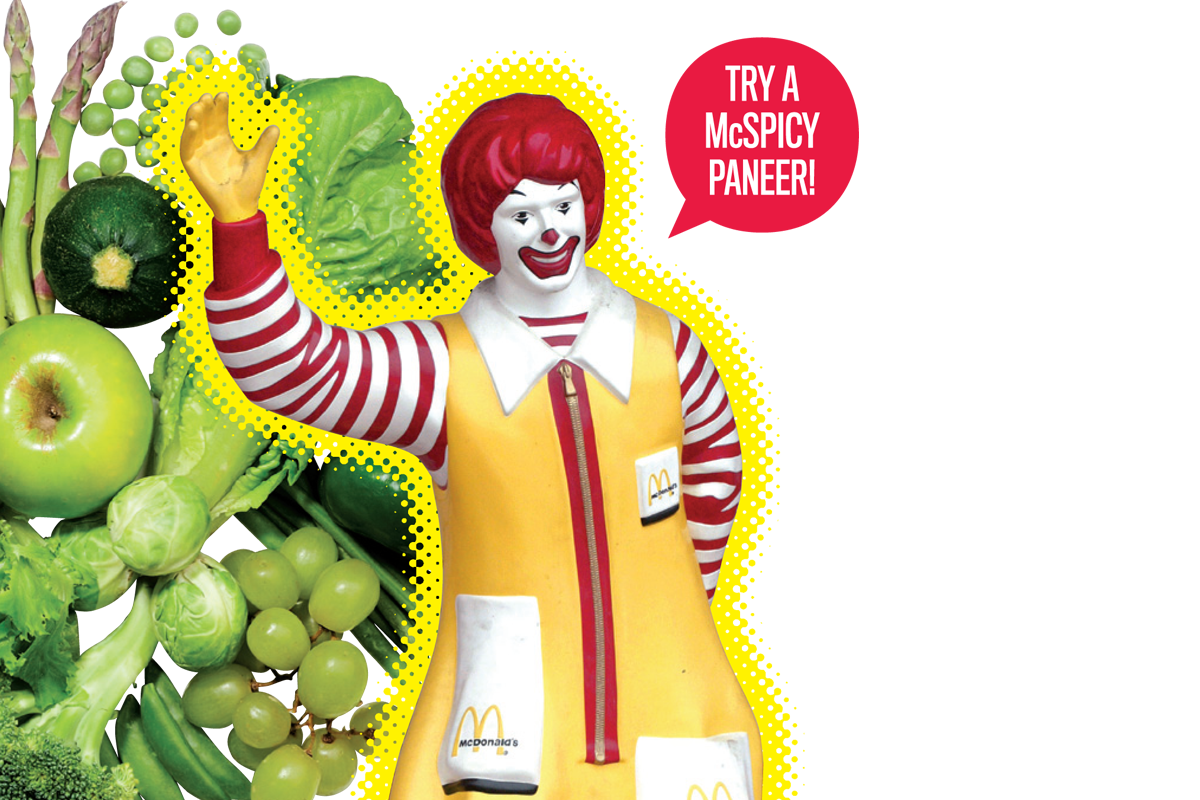
McDonald's is practically synonymous with burgers—the bigger and beefier, the better. So fans expressed a degree of shock last week when the fast-food juggernaut announced plans to open two all-vegetarian restaurants next year. The meatless eateries will debut in India, where the company already eschews beef and pork products in deference to Hindu and Muslim populations, and where it offers an array of veggie-friendly options: the McAloo Tikki "burger" (a spicy potato patty), and the McSpicy Paneer (deep-fried cheese).
India is a hot market these days for American brands looking to cash in on the country's burgeoning middle class. According to one estimate, the fast-food industry there is expected to almost triple by 2014, to $2.6 billion. Competitors such as Yum! Brands (which owns KFC, Taco Bell, and Pizza Hut) and Dunkin' Donuts are a growing presence, and Starbucks and Krispy Kreme both plan to launch stores before the end of the year.
Though McDonald's Indian outlets now account for less than 1 percent of its stores worldwide, the company desperately needs the business. Its stock has slumped almost 10 percent this year, and in July it reported declining profits in India and announced it would slash prices. The new all-veggie branches—in the Sikh holy city of Amritsar and the Kashmiri town of Katra, near the shrine of Vaishno Devi—take aim at the millions of religious pilgrims who abstain from meat each year as part of their journey to the holy sites.
The new effort comes with a rocky history. In 2001, American Hindus sued the brand for its use of small amounts of beef broth to make fries in the U.S. While beef was never used in India, Hindu protesters there ransacked restaurants, smearing Ronald McDonald statues with cow dung and demanding the chain be banned. In response to the company's latest plans, an official from a Hindu nationalist group told a British newspaper that the company was "associated with cow slaughter" and attempting to "humiliate Hindus."
For its part, McDonald's stresses that it "respects local cultures" and adapts its "menu and dining experience to local preferences." The proof is in the eating: those familiar golden arches are set against a white-and-blue background at many kosher McDonald's in Israel, where one can nosh on McFalafels and McShawarmas. In France diners sip wine with their burgers topped with local Cantal cheese. Even familiar sandwiches bear strange names (the Quarter Pounder is the Royal Cheese on the Continent) and local ingredients (Mexicans get refried beans and pico de gallo on their McMuffins.) There are McRice burgers in Singapore and McPoutine in Quebec. But vegetarians should be forewarned that there are no plans for a McSpicy Paneer stateside—sad news for one tweeter, who pouted, "I deMAND a curry veggie Big Mac ... vegetarians like burgers too."
Uncommon Knowledge
Newsweek is committed to challenging conventional wisdom and finding connections in the search for common ground.
Newsweek is committed to challenging conventional wisdom and finding connections in the search for common ground.





